Unit 1 How often do you exercise--period 1
- 格式:ppt
- 大小:1.14 MB
- 文档页数:30
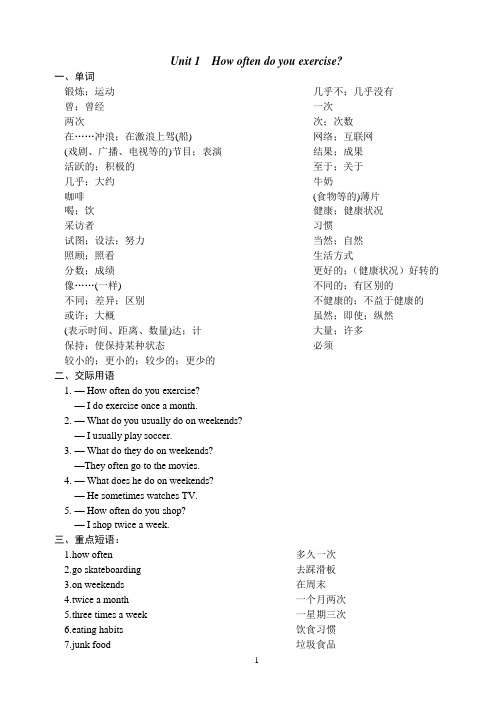
Unit 1 How often do you exercise?一、单词锻炼;运动几乎不;几乎没有曾;曾经一次两次次;次数在……冲浪;在激浪上驾(船) 网络;互联网(戏剧、广播、电视等的)节目;表演结果;成果活跃的;积极的至于;关于几乎;大约牛奶咖啡(食物等的)薄片喝;饮健康;健康状况采访者习惯试图;设法;努力当然;自然照顾;照看生活方式分数;成绩更好的;(健康状况)好转的像……(一样) 不同的;有区别的不同;差异;区别不健康的;不益于健康的或许;大概虽然;即使;纵然(表示时间、距离、数量)达;计大量;许多保持;使保持某种状态必须较小的;更小的;较少的;更少的二、交际用语1. — How often do you exercise?— I do exercise once a month.2. — What do you usually do on weekends?— I usually play soccer.3. — What do they do on weekends?—They often go to the movies.4. — What does he do on weekends?— He sometimes watches TV.5. — How often do you shop?— I shop twice a week.三、重点短语:1.how often 多久一次2.go skateboarding 去踩滑板3.on weekends 在周末4.twice a month 一个月两次5.three times a week 一星期三次6.eating habits 饮食习惯7.junk food 垃圾食品8.nine hours every night 每晚9个小时9.help sb (to) do sth 帮助某人做某事10.hardly ever 几乎很少11.keep healthy=keep in good health 保持身体健康12.get good grades 取得好成绩13.every day/ night 每天/晚14.go to the movies ________________________________15.look after=take care of ________________________________16.surf the Internet ________________________________17.take/do exercise=play/ do sports ________________________________18.be good/bad for ________________________________19.on/at weekends ________________________________e home from school ________________________________21.go shopping=do some shopping ________________________________22.want sb to do sth = would like sb to do sth ________________________________23.try to do sth ________________________________24.try doing sth. ________________________________25.try one’s best to do sth ________________________________四、重点句子1.What does she do on weekends? 她在周末干什么?2.How often do you shop? 你多久去逛一次街?3.I exercise once a week. 我每星期运动一次。

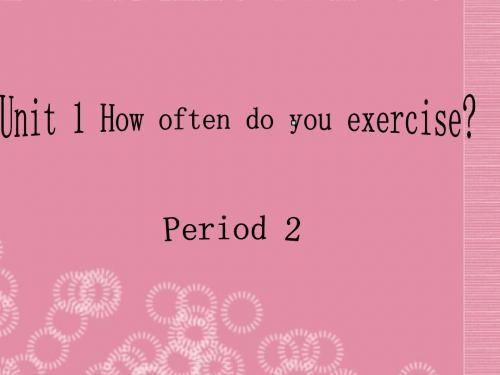
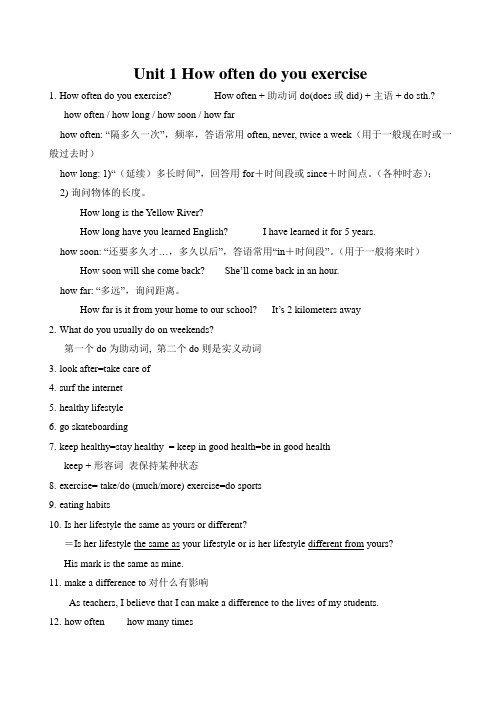
Unit 1 How often do you exercise1.How often do you exercise? How often + 助动词do(does或did) + 主语 + do sth.?how often / how long / how soon / how farhow often: “隔多久一次”,频率,答语常用often, never, twice a week(用于一般现在时或一般过去时)how long: 1)“(延续)多长时间”,回答用for+时间段或since+时间点。
(各种时态);2) 询问物体的长度。
How long is the Yellow River?How long have you learned English? I have learned it for 5 years.how soon: “还要多久才…,多久以后”,答语常用“in+时间段”。
(用于一般将来时)How soon will she come back? She’ll come back in an hour.how far: “多远”,询问距离。
How far is it from your home to our school? It’s 2 kilometers away2.What do you usually do on weekends?第一个do为助动词, 第二个do则是实义动词3.look after=take care of4.surf the internet5.healthy lifestyle6.go skateboarding7.keep healthy=stay healthy = keep in good health=be in good healthkeep + 形容词表保持某种状态8.exercise= take/do (much/more) exercise=do sports9.eating habits10.Is her lifestyle the same as yours or different?=Is her lifestyle the same as your lifestyle or is her lifestyle different from yours?His mark is the same as mine.11.make a difference to 对什么有影响As teachers, I believe that I can make a difference to the lives of my students.12.how often how many times13.most of the students=most students14.go shopping=do some shopping15.As for homework , most students do homework every day .as for...常用于句首,其后跟名词、代词或动词的-ing形式(即动名词)As for him,I never want to see him here16.eat less meat17.be good/bad for +名词、代词或动名词18.want (sb. ) to do sth. ask sb. to do sth. tell sb. to do sth. help sb. (to) do sth.====Word行业资料分享--可编辑版本--双击可删====19.try to do sth. try doing sth.e home from school21.of course=certainly=sure22.get good grades23.some advice advice 是不可数名词 a piece of advice 一则建议give advice 提出建议take one’s advice 采纳或听从某人的建议24.Good food and exercise help me to study better. better是well的比较级,而不是good 的比较级help sb to do sth =help sb with sth25.he result of a survey26.That sounds interesting.“主语+系动词+表语” sound(听起来),look(看起来),smell(闻起来),taste(尝起来),feel(觉得),seem(好象),grow(变得),get(变得)等词在英语中可用作系动词,后跟形容词作表语源-于-网-络-收-集。
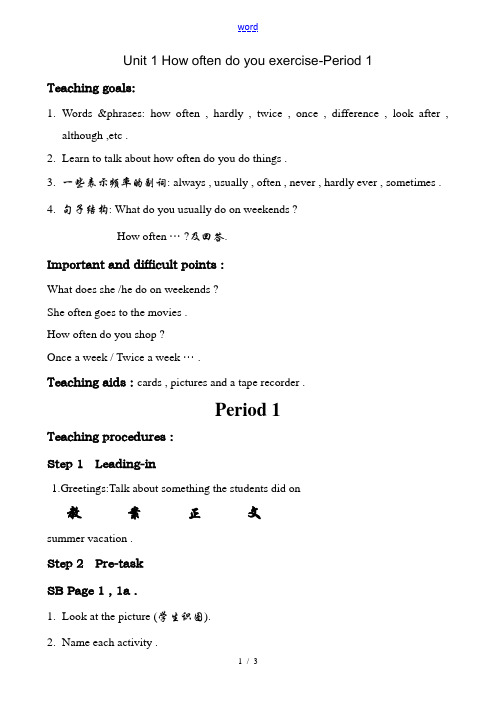
Unit 1 How often do you exercise-Period 1Teaching goals:1.Words &phrases: how often , hardly , twice , once , difference , look after ,although ,etc .2.Learn to talk about how often do you do things .3.一些表示频率的副词: always , usually , often , never , hardly ever , sometimes .4.句子结构: What do you usually do on weekends ?How often ··· ?及回答.Important and difficult points :What does she /he do on weekends ?She often goes to the movies .How often do you shop ?Once a week / Twice a week ··· .Teaching aids : cards , pictures and a tape recorder .Period 1Teaching procedures :Step 1 Leading-in1.Greetings:Talk about something the students did on教案正文summer vacation .Step 2 Pre-taskSB Page 1 , 1a .1.Look at the picture (学生识图). each activity .T: What are they doing ?They are shopping /reading /exercising /watching TV /skateboarding .(Help the students to answer )3.Write the activities on the line .4.Check the answers on the Bb .Correct their own activities .5.Practise reading .SB Page 1 , 1c .1.Focus on the conversation in the box .2.Practise reading .3.Pairwork : What do you do on weedends ? I ··· .4.Groupwork :Divide the class into groups of four or five .Make conversations .FirstS1 to S2:S1:What do you do on weekends ?S2:I ··· .S1:What does she /he do on weekends ?S2:She /He ··· .5. Act out their own dialogues .Step 3 While-taskSB Page 1 , 1b .1.Look at each picture in 1c.Tell what the person does on weekends .Check the Ssorally.2.Make sure what they will hear and do .3.Read these adverbs and explain.4.Play the tape twice .Write the letters on the line.SB Page 2 , 2a & 2b .1.read the activities and the answers of “how often” first .2.Practise reading .3.In 2a we should know the activities you hear .In 2b we should know the answersof how often he does the activities.4.Play the tape for a first time .Ss only listen .5.Play the tape a second time .Ss do 2a .6.Play the tape a third time .Check the answers .7.Play the tape .Ss do 2b .8.Check the answers .In this part ,we should pay attention to how often引起的特殊疑问句及回答.Step 4 Post-taskSB Page 2 , 2c .1.Focus on the conversation .2.Practice reading .3.Read the activities in the left box .4.Fill in the chart .5.Pairwork: Make conversations .Homework:1.Copy the new words.2.Review Section A 1a-2c3.prepare 3.。
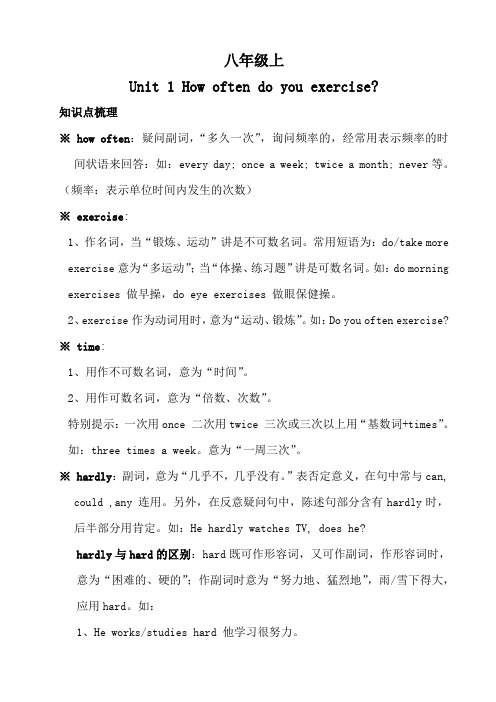
八年级上Unit 1 How often do you exercise?知识点梳理※how often:疑问副词,“多久一次”,询问频率的,经常用表示频率的时间状语来回答:如:every day; once a week; twice a month; never等。
(频率:表示单位时间内发生的次数)※ exercise:1、作名词,当“锻炼、运动”讲是不可数名词。
常用短语为:do/take more exercise意为“多运动”;当“体操、练习题”讲是可数名词。
如:do morning exercises 做早操,do eye exercises 做眼保健操。
2、exercise作为动词用时,意为“运动、锻炼”。
如:Do you often exercise? ※ time:1、用作不可数名词,意为“时间”。
2、用作可数名词,意为“倍数、次数”。
特别提示:一次用once 二次用twice 三次或三次以上用“基数词+times”。
如:three times a week。
意为“一周三次”。
※ hardly:副词,意为“几乎不,几乎没有。
”表否定意义,在句中常与can, could ,any 连用。
另外,在反意疑问句中,陈述句部分含有hardly时,后半部分用肯定。
如:He hardly watches TV, does he?hardly与hard的区别:hard既可作形容词,又可作副词,作形容词时,意为“困难的、硬的”;作副词时意为“努力地、猛烈地”,雨/雪下得大,应用hard。
如:1、He works/studies hard 他学习很努力。
2、It’s raining hard 雨下得很大。
※health:作不可数名词,意为“健康、身体状况”,keep in good health=stay/keep healthy保持健康。
be good/bad for one’s health对某人的健康有好处(害处)healthy:是形容词,反义词为unhealthy※ want: want=would like意为“想,想要”。
【八年级】八年级英语Unit 1 How often do you exercise教案【八年级】八年级英语unit1howoftendoyouexercise教案八年级英语单元今天你练习教案目标1.掌握正确使用频率副词和短语2.掌握如何描述课余时间的活动安排。
3.合理安排生活,养成健康的生活习惯。
重点1.词汇:①表示“频率”:always,usually,often,sometimes,hardlyever,never,once,twice,threetimesaweek,eve ryday② 关于“健康”:垃圾食品、健康、不健康、习惯2.句型:谈论某项活动或行为的频率e、 g:周末你通常做什么?howoftendoyoueatvegetable?大多数学生每天都在家工作。
教学难点准确理解和使用表达频率的副词和短语。
课时安排周期1第A1A-1c节period2sectiona2a-2c第3-4节period4sectionb1a-2c周期5B3a-4period6selfcheckandrevision周期1第A1A-1c节studyingaims1.掌握以下单词:exercise;skateboard;hardly;ever2.掌握句型:whatdoyoudoonweekends?我经常去看电影。
self-learning任务1?学习单词task2:小组对话练习句型:---你周末都做什么?---ialwaysdosomereading.任务3:完成1a。
---whatdoyoudoonweekends?---我要去看电影。
1.gotothemovie2.__________3.__________4.____________5.___________6.__________task4?讨论always;usually;often;sometimes;hardlyever;never的意义及它们在句中的位置。
八年级英语上册《Unit1 How often do you exercise?》教案人教新目标版Teaching aims of this unit:Language goals :1.Vocabulary: always usually often sometimes hardly ever never ,once a day ,twicea week ,three times a month, my eating habits ,healthy /unhealthy lifestyle , keep in good health, junk food ,eat less meat, the same as, be different from ,the difference between…and…, of course ,look after, be good /bad for, sleep nine hours every night all /most /some /no students ,maybe, although exercise =do/play sports2.Ask and answer : What do you usually do on weekends?I often watch TV on weekends.How often do you watch TV?I watch TV twice a week..How long do you sleep every night?I sleep nine hours every night.What are the differences?3. Topic :My lifestyle or habitsAims of abilities: Talk about how often you do thingsAims of emotion: Get the messages from the others successfully.nguage functions: Wh-questions, What do …?, How often …?,Adverbs of frequency, All/most/some/none课时安排4课时Period One: Section A (1a—2c)Period Two: Section A (3—4)Period Three: Section B (1a—2c)Period Four:Section B (3a—4)Period OneTeaching Aims:1. Learn to talk about how often do you do things2. To learn the words of the adverbs of frequency.Teaching Difficulties:1.words:exercise, skateboard, hardly, ever, shop, once, twice, time, surf, internet, program.2.phrases:how often, on weekends, go to the movies, exercise, go skateboarding,always , usually , often , never , hardly ever , sometimes .3.Sentence patterns: What does she /he do on weekends ? She often goes to the movies .How often do you shop ? Once a week / Twice a week ··· .Teaching Aids: Tape recorder; Multi-Media.Teaching Procedures:Step 1 :Greeting.1.Welcome back: Talk about their holidays.2.Encourage Ss to share their holidays with the whole class.Step 2 :Leading – in1. Do you like watching TV? Yes ,I do.Do you watch TV every day? Yes, I do.How often do you watch TV?I watch TV every day. I watch TV twice a week.2.Introduce the key vocabulary.Ask the students to say what they see in the thought bubbles.Check the answers on the board.2.3. Name each activity.Repeat reading the following: watch TV, read, shop, go skateboarding, exercise, draw 4. Look at each picture in 1c.Tell what the person does on weekends.Check the Ss orally.1) Make sure what they will hear and do .2) Read these adverbs and explain.5.Pl ay the t ape twice .Write the letters on the line.Ask Ss: Well, do you still remember your last vacation?How did you spend it?Was it the same as this summer vacation?So what do you often do in your summer vacation?Then show some phrases for Ss to practice.Then present as following:always>usually>often>sometimes>hardly e ver(几乎没有) >neverand let them understand their differences at the first time.Step 3 :Guessing Presentation and Practice.always, usually, often, sometimes, hardly ever(几乎没有) or never.And during this part, present surf the net exercise and go skateboarding. Step4 :.Do a survey:Activities How oftenT ake a showerWash your hairexerciseClean your roomAsk and answer: How often do you take a shower?How often does he take a shower?Let Ss ask and answer in pairs, using always, usually, often, som etimes, hardly ev er(几乎没有) or never.Step 5: Homework1.Do exercises on pages 1-2 of the workbook to practice the language presented in this unit.2.Remember what we learn today.ON BLACKBOARDUnit 1I always get up early.I am never late for class.I sleep nine hours every night.always usually often hardly ever neverof course , pretty healthy/good ,unhealthy ,a healthy lifestyle, try to dosth..,look after, help sb. to do sth., study better, the same as, be different fromPeriod TwoTeaching Aims:1. Students can learn to talk about activities andhow often to each other2. Students can listen, tal k ,read and write these words correctlyTeaching Difficulties:1. Words: high school, most, no, result, active, for as, for about2. Phrases: for as, for about3.Sentence patterns: How often do you shop? I shop once a month.How often does Cheng watch TV? He watches TV..Teaching Aids: Tape recorder; Multi-Media.Teaching Procedures:Step One :Greeting.Step Two :Leading – inDrills:T: What do you usually do on weekends ?S1: I usually play soccer .T: How often do you play soccer ?S1: I play soccer twice a week .T: How often does he play soccer ?The other Ss: He plays soccer twice a week .Repeat for three times .Step Three :Pre-taskReview the grammar box .Step Four :While-task1. Call attention to the survey .2.Make sure the Ss understand the chart .T: What activity do ninety-five percent of Green High students do every day ?3. Ss answer .If necessary , give them help .4. Review the information in the green box with Ss .5. Read the article first by the Ss .6. Check the answers .7. Practise reading .St ep Five :Post-task1.T: What can you do to improve your English ?(e.g. read English books, practice reading and speaking ) How often do you ··· ?2.Think of more things you can do to improve your English and write them here .3.Ask several Ss each question .4.See: Who is the best English students in the classStep Six: Homework:1.Revise the new words .2. Preview the next sectionON BLACKBOARDUnit 1How often do you watch TV?I watch TV twice a week.once a monththree times a yearall /most/ some /no students100%=one hundred per centPeriod ThreeTeaching Aims:Learn to talk about how often they do things to keep healthy.Teaching Difficulties:1.Words:junk food, milk, coffee, chips, cola, chocolate, drink, health, how many, interviewer.2.Phrases: how many, be good for, be bad for, every day.3.Sentence patterns: How often do you drink milk, Liu Feng?How many hours do you sleep every night?She says it’s good for my health.Teaching Aids: Tape recorder; Multi-Media.Teaching Procedures:Step 1 :Greeting.Step 2 :Warm-up1.Enjoy an English song.2.Free talk. Talk with Ss about the following questions:Do you like fruit vegetables?Yes, I do.I love it/ them. It’s/They’re delicious. And it’s /they’re healthy food. It’s/They’re good for our health. Or No, I don’t. It’s awful. I can’t stand it.Ask Ss: How often do you eat fruit vegetables?Step 3: Presentation1.Teach milk. Do you like milk? Do you drink milk every day? Why /Why not?2.Then teach chip /cola/chocolate/coffee in the sam e way. Don’t f orget to ask them Are they/Is it healthy food /drink? They’re /It’s healthy/unhealthy/ junk food. Don’t eat /drink them /it too often.Step 4: Pair workSs make a similar conversation by themselves.A: How often do you{ eat…? drink…?B : I eat/drink… every day/….A: Do you like it ?B: Yes, I do. It’s good for my health./No, I don’t. But my mother wants me to eat/drink it.Step5 : PresentationThe teacher asks Ss other questions:How often do you exercise/watch TV/read English/play computer games?How many hours do you exercise/watch TV/read English/sleep/pl ay computer games? Step 6: Pair workGet Ss to make a long conversation by themselves.Step 7: Listen (work on 2a)Get the Ss to listen and circle the answers to each question .Later check the answers. Step 8: Work on 2bListen again and fill in the blanks in the survey. Then check the answers.Step 9 .Group workRole play. Student A is the interview. Student B is Katrina. Student C is Bill. Try to act the conversation out .They can use their own words.Step 10.Task Get the Ss to ask their classmates as many questions as they can about their lives. The questions above (2b) can help them. After that they can give a report in front of the class.Step 11. Homework :1. Finish the exercise in this period.2. Write the report in the exercise book.Period Four:Teaching Aims:1. Learn following expressions:2. Learn to write one’s own habits.Teaching Difficulties:1.Words: habit, try, lifestyle, grade, better, same, as, different, difference,maybe, although, for, keep, must.2.Phrases: eating habits, look after, healthy lifestyle, unhealthy lifesty le, goodgrades.3. Main task: How to write a composition of one’s habits.Teaching Aids: Tape recorder; Multi-Media.Teaching Procedures:Step1: Revision1. Free talk:2.Ask and answerHow often do you exercise? How often do you eat vegetables/fruit/junk food?How often do you drink milk/coffee/tea? How many hours do you sleep every day? Use he/she/they ask and ans wer these questions.Group worksStep 2.Presentation and Practice1.Free talk.What is a healthy lifestyle.After that, T can show a picture with healthy lifestyle and unhealthy one:eat fruit never eat vegetables/fruitvegetables drink coffee/wine too muchdrink milk never drink milksleep 9 hours sleep 5 hoursdo exercise never do exercisehealthy lifestyleunhealthy lifestyleT: And you know: Healthy lifestyle can help us get good grades. Good food and exercisehelp us to study better. My student Katrina has a good lifestyle. Let’s see it.Step 3.Read 3a.Compare the passage with yourselves.Explain:of course , pr etty healthy/good ,unhealthy ,a healthy lifestyle, try to do sth.., look after, help sb. to do sth., study better, the same as, be different from Give more examples.Step 4. Finish 3b.Se p 5.Homework:Read the text for many many times. And correct your composition referring to it.ON BLACKBOARDUnit 1I always get up early.I am never late for class.I sleep nine hours every night.always usually often hardly ever neverof course , pretty heal thy/good ,unhealthy ,a healthy lifestyle, try to do sth.., look after, help sb. to do sth., study better, the same as, be different from单元反思:本单元围绕有规律地安排活动及培养健康的饮食习惯等话题展开教学活动,学生在学习一些体育运动词汇的基础,掌握时间频度副词的用法,并进一步学会熟练使用“How oftendo you…?”这个句型。